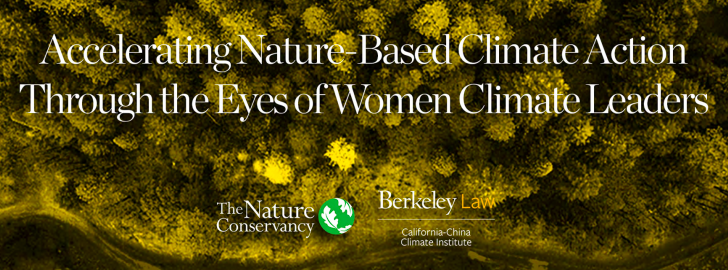DESCRIPTION
Nature-based climate change solutions (NBS) consist of actions to reduce or sequester greenhouse gas emissions (GHG) in natural ecosystems in urban, ex-urban, rural, wildland and other environments. These actions include interventions such as directed land use decisions that avoid conversion of open space or agricultural land for more intensive uses, landscape restoration, alternative management for farms and forests, and application of soil amendments. Nature-based solutions confer multiple benefits beyond emissions reductions and carbon sequestration, such as landscape resilience and adaptation, improved air quality, biodiversity and habitat protection, improved water quality and quantity, and reduced impacts of extreme events such as floods or wildfires, jobs, and recreational opportunities. In collaboration with the Nature Conservancy California and China and Tsinghua University, our work focuses on advancing NBS in climate policymaking through research projects, sharing lessons-learned, convening stakeholders, and a webinar series.
PUBLICATIONS
 |
Achieving Net Greenhouse Gas Reductions Through Wetland RestorationThis brief summarizes how wetlands contribute to climate change mitigation and factors that affect greenhouse gas flux in wetlands. Lessons and experiences from the Sacramento-San Joaquin Delta, California provide insights for other regions on best practices that could be adopted, as well as existing gaps and challenges. |
 |
Tracking Carbon Emissions across the Wood Product Supply Chain: Carbon Associated with Wood Product Imports into California and ChinaGiven California’s and China’s ambitious climate goals and their history of climate policy collaboration, understanding the emissions associated with their wood products is an important step in building more sustainable supply chains globally. In this policy brief, we estimate the carbon associated with wood product imports into California and China, using a consumption-based approach that quantifies emissions and sequestration from all stages of the wood product supply chain. |
|
|
Achieving a Multi-Beneficial Nature-Based Climate Strategy: An Institutional Framework for Advancing Subnational Climate ActionNew research outlines a new Nature-Based Solutions (NbS) Governance Framework, to support subnational policymakers in integrating nature-based strategies into climate policy planning processes. NbS approaches such as regenerative agriculture, forest restoration, and green infrastructure, confer concurrent |
 |
Q&A: Accelerating Nature-Based Climate Action Through the Eyes of Women Climate LeadersA Q&A from the recent COP26 event "Accelerating Nature-Based Climate Action Through the Eyes of Women Climate Leaders." The women leaders shared their perspectives on the importance of nature-based climate solutions, female leadership, and what it will take to accelerate climate action. |
 |
California-China Collaborative Action: A Key Pathway to Accelerate Nature-based Climate SolutionsHow can forests, wetlands, and farms provide solutions to meet our climate goals? How do we create and implement policies to support the ecosystems that we depend on to sequester carbon, protect coastal cities from floods and heat waves, and provide us with clean air and water? Answering these questions is at the center of the Nature Conservancy (TNC) and the California-China Climate Institute’s (CCCI) ongoing work to advance nature-based climate solutions (NbS) in California and China. |
RECENT ACTIVITIES
See more events on nature-based climate solutions: https://www.youtube.com/playlist?list=PLnJTTi79cgf21gS8lD8Bn_sIsjzGZ1XmB
CORE RESEARCH TEAM
Jessica Gordon, Fan Dai,
In collaboration with The Nature Conservancy California and China, Tsinghua University and
Professor Iryna Dronova, UC Berkeley


